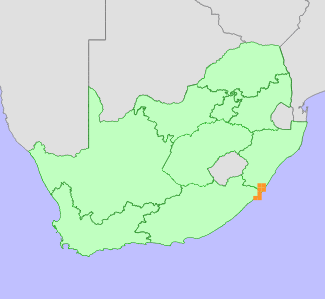|
Scientific Name | Kniphofia coddiana Cufod. |
Higher Classification | Monocotyledons |
Family | ASPHODELACEAE |
Synonyms | Kniphofia elegans Codd |
Common Names | Codd's Poker (e) |
National Status |
Status and Criteria | Near Threatened B1ab(iii) |
Assessment Date | 2021/03/26 |
Assessor(s) | C.R. Scott-Shaw & J.E. Victor |
Justification | Endemic to the Eastern Cape and KwaZulu-Natal provinces, this species has an extent of occurrence (EOO) of 2103 km² and is documented in 15 locations. Over 50% of its habitat has been lost to agriculture (commercial and communal farming) and rural settlement expansion. The degradation of this species' habitat persists in areas outside provincial conservation zones, marked by frequent and often aseasonal fires, overgrazing by cattle, and the proliferation of alien invasive plants. This species therefore qualifies for listing as Near Threatened under criterion B. |
Distribution |
Endemism | South African endemic |
Provincial distribution | Eastern Cape, KwaZulu-Natal |
Range | This species has a restricted distribution in the Pondoland area, between Mkambati and Oribi Gorge. |
Habitat and Ecology |
Major system | Terrestrial |
Major habitats | Scarp Forest, Transkei Coastal Belt, Pondoland-Ugu Sandstone Coastal Sourveld, KwaZulu-Natal Coastal Belt Grassland |
Description | It occurs in coastal grassland, on Msikaba Formation Sandstone rock outcrops, 70-600 m.a.s.l. |
Threats |
| At least 55% of this species' habitat has been lost in the past due to agriculture, primarily sugarcane and fruit trees, as well as rural settlements. Most of the subpopulations are currently protected and face minimal threats. However, subpopulations outside the protected areas are at risk due to the invasion of alien plants, overgrazing of remnant grassland patches, harvesting for medicinal purposes, and habitat loss resulting from rural settlement expansion. |
Population |
The population size is unknown, but a decline is inferred from ongoing loss and degradation outside protected areas. Monitoring is essential to assess the impact of grazing and fires on the population.
|
Population trend | Decreasing |
Conservation |
| It is conserved in part of its range. |
Assessment History |
Taxon assessed |
Status and Criteria |
Citation/Red List version | | Kniphofia coddiana Cufod. | NT B1ab(iii) | Raimondo et al. (2009) | | Kniphofia coddiana Cufod. | Lower Risk - Near Threatened | Scott-Shaw (1999) | | Kniphofia coddiana Cufod. | Rare | Hilton-Taylor (1996) | | Kniphofia coddiana Cufod. | Rare | Hall et al. (1980) | |
Bibliography |
Cloete, E. 2004. A Floristic Study of a Portion of the Pondoland Centre of Endemism, Port St Johns, South Africa. Unpublished MSc, Rhodes University, Grahamstown.
Hall, A.V., De Winter, M., De Winter, B. and Van Oosterhout, S.A.M. 1980. Threatened plants of southern Africa. South African National Scienctific Programmes Report 45. CSIR, Pretoria.
Hilton-Taylor, C. 1996. Red data list of southern African plants. Strelitzia 4. South African National Botanical Institute, Pretoria.
Raimondo, D., von Staden, L., Foden, W., Victor, J.E., Helme, N.A., Turner, R.C., Kamundi, D.A. and Manyama, P.A. 2009. Red List of South African Plants. Strelitzia 25. South African National Biodiversity Institute, Pretoria.
Scott-Shaw, C.R. 1999. Rare and threatened plants of KwaZulu-Natal and neighbouring regions. KwaZulu-Natal Nature Conservation Service, Pietermaritzburg.
|
Citation |
| Scott-Shaw, C.R. & Victor, J.E. 2021. Kniphofia coddiana Cufod. National Assessment: Red List of South African Plants version 2024.1. Accessed on 2026/02/07 |
 Comment on this assessment
Comment on this assessment

